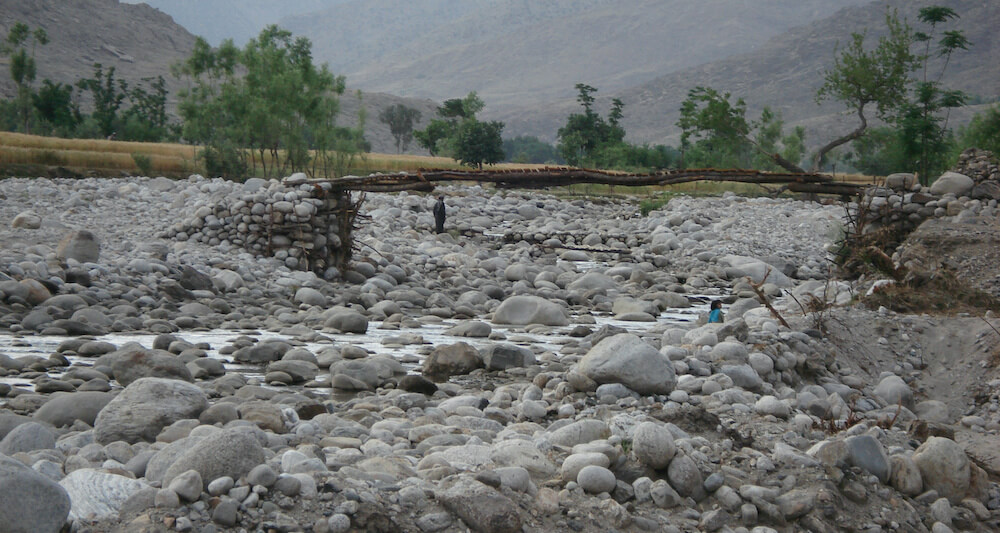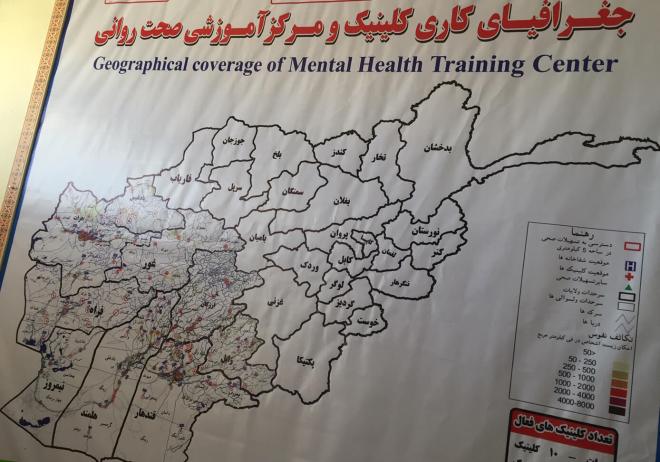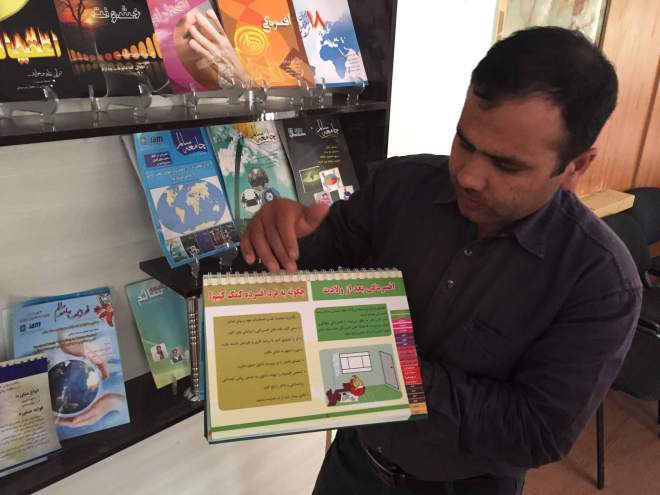
By Christie R. House
May 2020 | ATLANTA
[We] exist to bring hope and transformation to the people of Afghanistan. We focus on building capacity in the sectors of health and development – seeing lives changed through eye care, community development, health projects and education. We believe that the people of Afghanistan can build a more just, peaceful and sustainable future.
UMCOR’s ecumenical partner in Afghanistan
Name is withheld for security reasons.
For many, Afghanistan is known only as a country wracked by decades of war and terror. Yet, since 1966, United Methodists have been meeting the Afghan people where they are in rural, isolated communities and in larger cities through a partner that offers health, development and educational services. While United Methodists have not been the only supporters of this partner’s work, Global Ministries has provided consistent support through a variety of channels, including project funding and personnel, since its inception.

region.
PHOTO: DAVID WILDMAN
UMCOR’s ecumenical partner works with the Afghan government and the ministry of health to reach vulnerable populations. In an early survey, they recognized a high incidence of vision problems in Afghanistan. The first health expertise offered by this partner formed the National Organization for Ophthalmic Rehabilitation program, or NOOR, which also means “light” in the local language. The World Health Organization estimates that as much as 80% of the world’s blindness is preventable. Today, NOOR operates three hospitals in Afghanistan, one of which is also a training facility to equip Afghan ophthalmologists and eye technicians.
In time, the ecumenical partner branched into other services directed at community health, including water, sanitation and hygiene (WASH) projects, community development projects and food security and nutritional needs through sustainable agriculture. In recent years, expertise in mental health has emerged as a growing need.
The agency’s mental health program works through communities with a family-based approach to improve the lives of children and adolescents, particularly those with psychosocial disabilities. These conditions are widely misunderstood in Afghanistan, as Sadiga* and her family discovered.
But how do we help him?
Sadiqa had tried everything she could to help her 8-year-old son, Aziz*. She took him to clinics and hospitals looking for a solution to his seizures. He was unable to walk well, climb stairs, or even go to the bathroom by himself. These issues were compounded with behavioral problems. With three other children, Sadiqa was often overwhelmed. She lost hope that Aziz would ever get better.
“Someone always had to be with him,” Sadiqa said. Aziz would hit himself and his siblings, break things and walk around the house making lots of noise. “Sometimes he was so disruptive, I would lose control and beat him,” his mother said.
A lack of services and awareness about mental health mean that many people in Afghanistan are struggling. The Child and Adolescent Psychiatry Project (CAPP) offers children with mental health issues and their families the support they need through a combination of medical treatment, counseling, physical and occupational therapy and practical coaching.
UMCOR’s ecumenical partner’s team prescribed medication for Aziz and asked Sadiqa to bring him to the center each week to receive counseling and practical support. “[The mental health workers] encouraged me to spend time with him, playing football with him, talking with him, going out with him,” Sadiqa confirmed. In the past, she didn’t take Aziz many places because of his disruptive behavior. Now, she brings him into the neighborhood or to the bazaar.
The changes in Aziz’s life have affected his whole family. In just two months, Aziz learned to use the bathroom by himself. He can now walk up the stairs. He plays outside with other children and listens when his mother asks him to sit quietly.
The mental health program for children and adults addresses mental health issues holistically, involving the child, the parents, and the community; while medical treatment can be an important factor, the tools families learn together through counseling and therapy also play a key role and strengthen the entire family.
Sadiqa now has hope for Aziz and plans to continue counselling and therapy with him so that he can improve even more. “I want him to get better,” she says. “So, I will keep taking him to the clinic…It makes me very happy to see him getting better.”
A new grant was approved by UMCOR’s Board of Directors during its Spring 2020 meeting+ to support this partner’s mental health programming. This necessary work helps to create peace in the family and the community.
Adapting to address coronavirus in the community
The CAPP mental health programming started in 1996 in Herat, a town on the western border with Iran, in response to a high suicide rate among women in the region. (The high suicide rate is due to domestic violence in many instances.)

Center in Herat.
PHOTO: DAVID WILDMAN
Since 2006, the ecumenical agency has systematically trained all primary health care providers (such as community health supervisors, nurses, midwives and doctors) throughout the country’s western region to carry out mental health services. The agency also trained nonmedical professionals (teachers and religious leaders) in the western and northern regions, produced TV and radio programs and published a quarterly magazine to raise awareness about mental health. All of these networks and relationships developed over more than a decade have placed UMCOR’s ecumenical partner in the crossroads of the Afghan response to the coronavirus.
Hundreds of thousands of Afghans working in Iran were severely affected when Iran closed its borders because of a rapidly growing outbreak of COVID-19. Afghan migrant workers flooded back home into Herat beginning early in March and continuing through April. Some carried the novel coronavirus back home. This is a major concern for a country that has a fragile health system and economy and has endured over 40 years of armed conflict.
The ecumenical health and development agency is helping Afghan communities and the government in the fight to stop the spread of COVID-19 by providing services, raising awareness and informing people how to prevent the transmission of COVID-19. Included with awareness and prevention resources are materials about managing the stress and anxiety that many are experiencing and contacts for counseling and support for people throughout Afghanistan. The agency is preparing and distributing personal protection equipment to health centers and technical and management assistance to the Provincial Public Health Directory and health committees in the provinces.
The thousands of returning migrant workers no longer send back remittances or earn an income. Thousands of workers in the informal sector also lack an income. Ongoing armed conflict, repeated droughts and the heightened economic instability add pressures to the country’s fragile health sector. For many Afghans, COVID-19 is simply one more crisis on top of so many others. Yet in this uncertain context, UMCOR’s partner agency provides a steadfast presence, serving the needs of some of the most vulnerable, like Sadiqa and her family.
* Names of beneficiaries have been changed.
+ Some grants await clearance because of current constraints of the COVID-19 pandemic.
Christie R. House is a writer and editor consultant with Global Ministries.
Contribute to the ongoing work of Community-Based Health & Development in Afghanistan, Advance #3020522.

